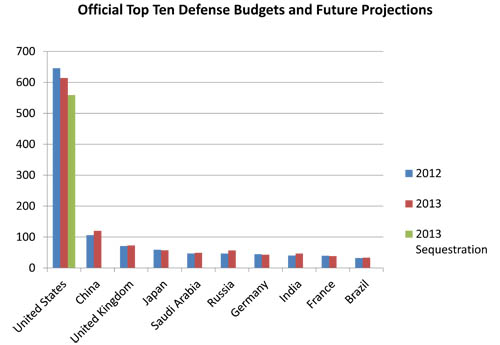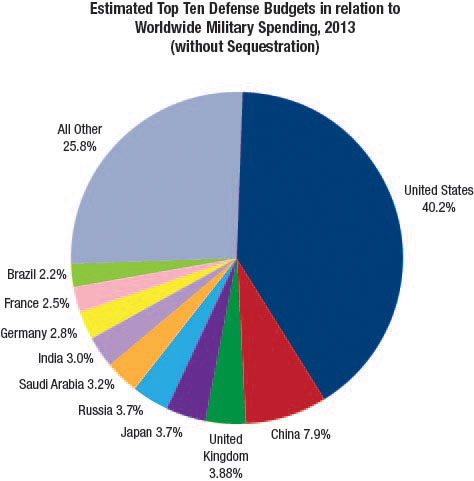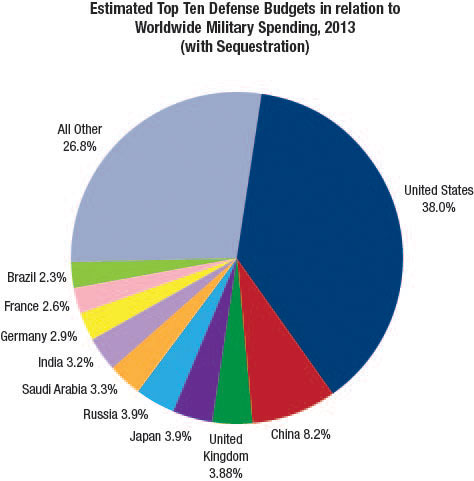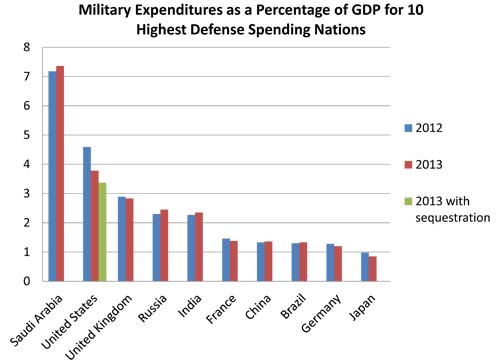PART II: Defense Sequestration and America’s Military Spending Compared to the World
Editor’s Note: This article appeared in a five-part series for
Time Magazine’s Battleland blog
.
A version of the article was presented at a private event at Brookings organized by the
Center for Northeast Asian Policy Studies
and the
21st Century Defense Initiative
. The article is also
available in Korean
.
In the last part, we saw how a massive and growing debt (as well as a dose of bad politics) has set America on a path towards sequestration, or, at the very least, the potential of serious levels of defense cuts. But to understand the actual impact that these cuts might have, including weighing the predictions that such a scenario would “destroy the US military” or mean the US would be “unable to keep up with potential adversaries,” it is useful to pull back and examine where the US defense budget stands in relation to the rest of the world.
The U.S. is the only global superpower, with capabilities and responsibilities that dwarf any and every other state in the world. And, as the below charts show, the U.S. defense budget reflects that reality, outspending all other nations by a significant amount. What is notable about the scale of the U.S. budget is not just its relative size to other nations, but also how many other of the major players (albeit an order of magnitude smaller) are close U.S. allies, like the U.K. or Japan, or unlikely foes, like India or Brazil. Only two of the top ten, China and Russia could be put in the category of potential adversaries.
Another way to visualize this is to combine all the world’s military spending together. At the height of the Iraq war, U.S. spending was above half of all the world’s military spending, but is now down to slightly above 40% of all military spending. Sequestration would take it down by about 2% more of the pie, roughly 38% of all global military spending, excluding any likely contingency or war spending.
Indeed, it is only on percent of GDP where the U.S. is not ahead, in second place to Saudi Arabia. But here again, sequestration doesn’t change the overall ranking.
As a side note, one of the fascinating disconnects in American politics today is between the above data and public perceptions of defense spending, which many unfortunately are quick to exploit in our “post truth” era of politics. Only 58% of voters are aware that the U.S. spends more on defense than any other country in the world. And just 33% recognize that America spends almost as much on defense as the rest of the world combined.[13]
| «Read Part 1: The Sequestration Situation | Read Part 3: The Sequestration Story in East Asia» |
[9] The sources used to assemble this chart include:
“OMB Report Pursuant to the Sequestration Transparency Act of 2012 (P. L. 112–155),” Office of Management and Budget, September 14, 2012, http://images.politico.com/global/2012/09/120914_omb_report_sequestration.html.
“Long Term Implications of the 2013 Future Years Defense Program,” Congressional Budget Office, July 2012, http://www.cbo.gov/sites/default/files/cbofiles/attachments/07-11-12-FYDP_forPosting_0.pdf.
The Military Balance 2012, International Institute for Strategic Studies, (London: Routledge, 2012).
“DOD Releases Fiscal 2013 Budget Proposal,” U.S. Department of Defense, February 13, 2012. http://www.defense.gov/releases/release.aspx?releaseid=15056
Keith B. Richburg, “China military spending to top $100 billion in 2012, alarming neighbors,” The Washington Post, March 4, 2012, http://www.washingtonpost.com/world/china-military-spending-to-top-100-billion-this-year/2012/03/04/gIQAJRnypR_story.html.
Pierre Tran, “French Defense Ministry Faces Budget , Staff Cuts,” DefenseNews, June 29, 2012, http://www.defensenews.com/article/20120629/DEFREG01/306290005/French-Defense-Ministry-Faces-Budget-Staff-Cuts.
Pierre Tran, “French Budget Holds Defense Spending Flat,” DefenseNews, August 2, 2012, http://www.defensenews.com/article/20120802/DEFREG01/308020003/French-Budget-Holds-Defense-Spending-Flat.
Paul Kallender-Umezu, “Japan Strives to Overcome Defense Industrial Base ‘Crisis’,” DefenseNews, June 24, 2012, http://www.defensenews.com/article/20120624/DEFREG03/306240003/Japan-Strives-Overcome-Defense-Industrial-Base-8216-Crisis-8217-.
“Highlights: Japan’s 2012/13 budget meets targets with sleight of hand,” Reuters, December 23, 2011, http://www.reuters.com/article/2011/12/24/japan-economy-budget-idUSL3E7NL37B20111224
“Defence budget (Russian Federation), Defence Budget,” Jane’s Sentinal Security Assessment, March 12, 2012, http://articles.janes.com/articles/Janes-Sentinel-Security-Assessment-Russia-And-The-CIS/Defence-budget-Russian-Federation.html.
Robert Barlin, “Defence Export Unit: Gulf Region Marketing Opportunities,” Department of Defence, Australian Government, http://www.defence.gov.au/deu/docs/Gulf_Region_Market_Opportunities.pdf.
Albrecht Muller, “Germany To Boost Defense Budget by 133M Euros,” DefenseNews, September 7, 2011, http://www.defensenews.com/article/20110907/DEFSECT05/109070303/Germany-Boost-Defense-Budget-by-133M-Euros.
Laxman K. Behera, “India’s Defence Budget 2012-2013, March 20, 2012, http://www.idsa.in/idsacomments/IndiasDefenceBudget2012-13_LaxmanBehera_200312.
“Natural resources rich Brazil plans to increase defense spending to 2% of GDP,” MercoPress, May 31, 2012, http://en.mercopress.com/2012/05/31/natural-resources-rich-brazil-plans-to-increase-defence-spending-to-2-of-gdp.
“World Economic Outlook Database,” International Monetary Fund, April 2012, http://www.imf.org/external/pubs/ft/weo/2012/01/weodata/index.aspx.
[10] Ibid.
[11] Ibid.
[12] Ibid.
[13] Scott Rasmussen, “Ready to Cut Military Spending,” Reason.com, October 2012, http://reason.com/archives/2012/09/17/ready-to-cut-military-spending/1 .
The Brookings Institution is committed to quality, independence, and impact.
We are supported by a diverse array of funders. In line with our values and policies, each Brookings publication represents the sole views of its author(s).
 [9]
[9]

 [12]
[12]


Commentary
Separating Sequestration Facts from Fiction: Defense Sequestration and What It Would Do for American Military Power, Asia, and the Flashpoint of Korea
September 23, 2012